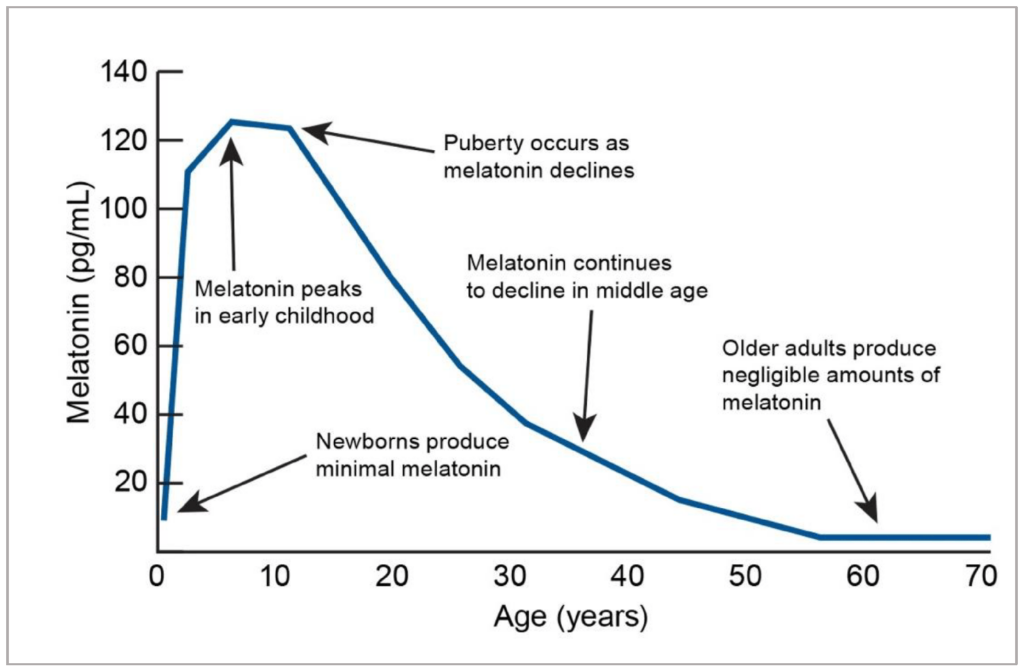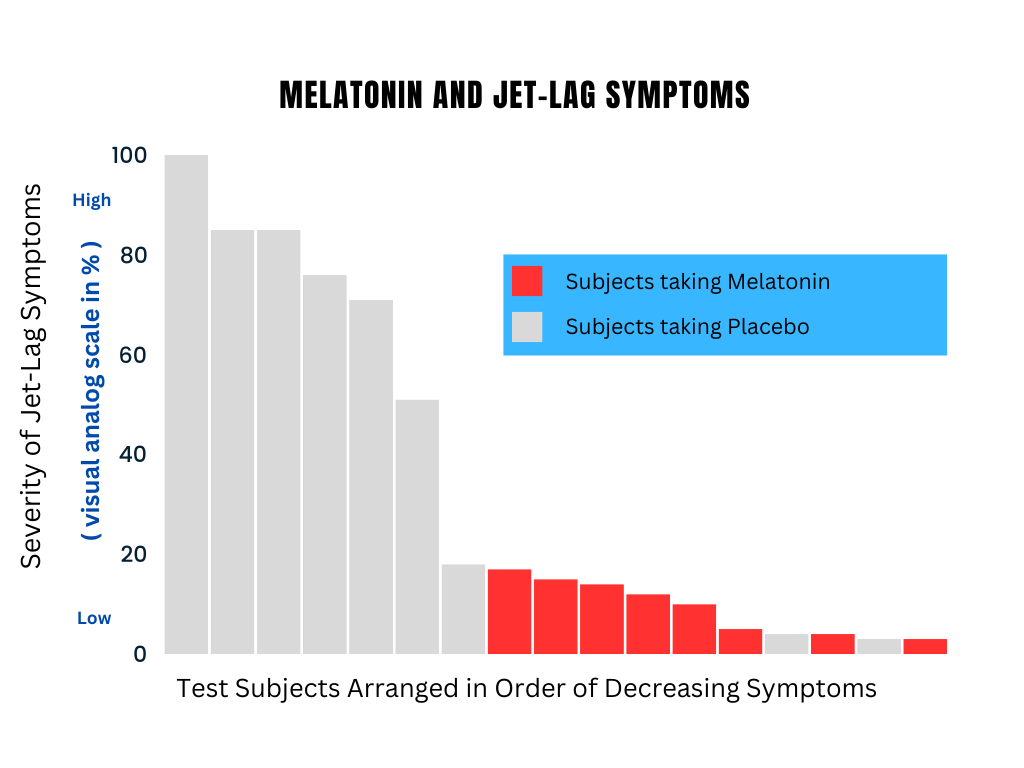In a world where sleep struggles are all too common, melatonin has emerged as a trusted natural remedy. This powerful hormone not only regulates our sleep-wake cycle but also offers a range of other health benefits. Whether you’re dealing with occasional sleeplessness, jet lag, or simply looking to enhance your overall well-being, melatonin supplementation might be the solution you need. But how does melatonin work, and what makes it so effective? Let’s explore the science behind this fascinating compound.
What is Melatonin?
Melatonin is a hormone naturally produced by the pineal gland in response to darkness. It helps regulate the body’s circadian rhythm, signalling when it’s time to sleep and wake up. However, factors such as excessive screen time, shift work, ageing, and stress can disrupt melatonin production, leading to sleep difficulties. Supplementing with melatonin can help restore balance and improve overall sleep quality [1].
Melatonin and Sleep Improvement
Melatonin is best known for its ability to promote restful sleep. Scientific research highlights several key benefits:
- Reduces the time it takes to fall asleep – Studies show that melatonin supplementation can shorten sleep onset latency, making it easier to drift off [2].
- Improves sleep duration and quality – By enhancing deep sleep stages, melatonin helps ensure a more restorative night’s rest [3].
- Alleviates jet lag – Melatonin is highly effective in resetting the body’s internal clock, reducing the symptoms of jet lag for travelers [4].
- Supports shift workers – Those who work irregular hours can benefit from melatonin’s ability to regulate disrupted sleep patterns [5].
Improved Sleep Quality

The most well-known benefit of melatonin is its ability to promote better sleep. Melatonin helps regulate your body’s internal clock, signalling to your brain that it’s time to sleep. For individuals with insomnia or disrupted sleep patterns, such as shift workers or those experiencing jet lag, melatonin supplementation can be particularly effective. Studies have shown that melatonin can reduce the time it takes to fall asleep, increase total sleep duration, and improve sleep quality [6].
Alleviation of Jet Lag

Jet lag occurs when your internal clock is out of sync with the time zone you’re in, often resulting in sleep disturbances, fatigue, and difficulty concentrating. Melatonin can help realign your circadian rhythm with the new time zone, reducing the symptoms of jet lag. Taking melatonin at the appropriate time before your flight and during your trip can make the transition smoother and help you adapt more quickly to the new time zone.
Beyond Sleep: Additional Health Benefits of Melatonin
While melatonin is primarily associated with sleep, emerging research suggests it has several other important health benefits:
- Powerful Antioxidant Properties – Melatonin acts as a potent antioxidant, helping to protect cells from oxidative stress and reducing inflammation [7].
- Supports Immune Function – Studies indicate that melatonin can modulate immune responses, making it beneficial for overall health and disease prevention [8].
- May Promote Brain Health – Research suggests that melatonin may support cognitive function and protect against neurodegenerative diseases such as Alzheimer’s [9].
- Aids in Mood Regulation – Melatonin has been linked to improved mood and reduced symptoms of depression and anxiety, possibly due to its effects on neurotransmitter balance [10].
Support for Seasonal Affective Disorder (SAD)
Seasonal Affective Disorder (SAD) is a type of depression that occurs at certain times of the year, usually in the winter when daylight hours are shorter. Melatonin levels can be affected by the reduced exposure to natural light, contributing to the symptoms of SAD. Supplementing with melatonin can help regulate these levels and improve mood, making it a useful tool in managing SAD [11].
Antioxidant Properties
Melatonin is a powerful antioxidant, which means it helps protect cells from damage caused by free radicals. Free radicals are unstable molecules that can damage cells and contribute to ageing and diseases such as cancer. Melatonin’s antioxidant properties can help neutralise these harmful molecules, reducing oxidative stress and potentially lowering the risk of chronic diseases [12].
Immune System Support
Research suggests that melatonin can also support the immune system. It helps regulate immune responses and has been shown to enhance the activity of various immune cells, including T cells and natural killer cells. This immune-boosting effect can help your body better defend itself against infections and diseases [13].
Potential Benefits for Eye Health
Melatonin may play a role in protecting eye health. It has been found to have protective effects against conditions like age-related macular degeneration (AMD) and glaucoma. Its antioxidant properties help reduce oxidative damage in the eyes, which can contribute to these conditions [14].
How to Supplement with Melatonin Safely
To maximise the benefits of melatonin, it’s essential to use it correctly. Here are some guidelines for safe and effective supplementation:
- Choose the right dose – Melatonin is available in doses ranging from 0.3mg to 10mg. For sleep, lower doses (1-3mg) are often effective, while higher doses may be used for specific conditions.
- Take it at the right time – Melatonin should be taken 30-60 minutes before bedtime to align with the body’s natural rhythm.
- Avoid excessive use – While melatonin is safe for short-term use, long-term reliance should be discussed with a healthcare professional.
- Consult a doctor – If you are on medications or have underlying health conditions, speak with a healthcare provider before starting melatonin supplementation.
Conclusion
Melatonin is more than just a sleep aid—it’s a powerful hormone with broad-ranging benefits for overall health. Whether you’re looking to improve sleep quality, support immune function, or protect against oxidative stress, melatonin can be an invaluable addition to your wellness routine. By using it wisely and in alignment with your body’s needs, you can unlock its full potential for better sleep and beyond.
References
- Reiter RJ, Tan DX, Korkmaz A, Ma S. “Melatonin and its role in sleep regulation and beyond.” Neurosci Biobehav Rev. 2014.
- Ferracioli-Oda E, Qawasmi A, Bloch MH. “Meta-analysis: Melatonin for the treatment of primary sleep disorders.” PLoS One. 2013.
- Xie Z, et al. “Impact of melatonin supplementation on sleep quality: A systematic review and meta-analysis.” Sleep Med. 2017.
- Herxheimer A, Petrie KJ. “Melatonin for preventing and treating jet lag.” Cochrane Database Syst Rev. 2002.
- Jaiswal SJ, et al. “The role of melatonin in shift work disorder.” Sleep Health. 2016.
- Ferracioli-Oda E, et al. “Meta-analysis: melatonin for the treatment of primary sleep disorders.” PLoS One. 2013.
- Tan DX, et al. “Melatonin as a natural antioxidant.” J Pineal Res. 2007.
- Carrillo-Vico A, et al. “Melatonin: Buffering the immune system.” Int J Mol Sci. 2013.
- Cardinali DP, Furio AM, Brusco LI. “Melatonin and neurodegenerative diseases.” Neurotox Res. 2010.
- Hardeland R. “Melatonin and depression: A translational approach.” Neurosci Biobehav Rev. 2012.
- Brown GM. “The role of melatonin in seasonal affective disorder.” Oxford Academic Journal. 2009
- Reiter RJ, Tan DX, Korkmaz A, Ma S. “Actions of melatonin in the reduction of oxidative stress. A review.” J Biomed Sci. 2000.
- Carrillo-Vico A, et al. “Melatonin: buffering the immune system.” Int J Mol Sci. 2013.
- Haozhe Y, et al. “Therapeutic Effects of Melatonin on Ocular Diseases: Knowledge Map and Perspective.” Frontiers in Pharmacology. 2021

